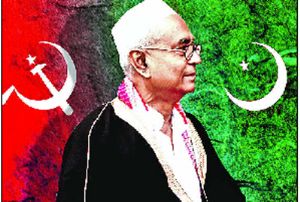
Kolkata, October 19: A West Bengal CPM stalwart is on a pilgrimage to Mecca. Days ahead of embarking on Haj, Abdur Rezzak Mollah, credited for sounding an early warning on the Left Front's disastrous land acquisition policy, insisted his faith in Karl Marx figured way below his absolute devotion to Allah and Prophet Mohammed.
Mollah was land and land reforms minister in the Buddhadeb Bhattacharjee government. Even as minister, he never minced words against the CM's line on Nandigram and Singur that ultimately caused the Left's spectacular electoral crash. The Canning East MLA had distanced himself from the policy, saying he wasn't kept in the loop.
Among the few CPM leaders who held their seats in the face of the crushing Mamata typhoon, Mollah was appointed party whip. A vocal critic of Bhattacharjee and then industries minister Nirupam Sen, he had claimed the rich and the powerful controlled the party that had drifted far from its ideological moorings.
A veteran in a party that swears by the credo religion is the opium of the masses, Mollah said he wasn't entirely disillusioned, but was convinced that a world free of exploitation was utopia. He was bitter and criticized the CPM saying: "Our party has no leaders. It only has managers." Party general secretary Prakash Karat was one such.
Years ago, another party senior, Late Benoy Chowdhury, had fetched up at Tirupati with his newlywed. The couple had apparently been seen near the shrine. A furious party had sought an explanation. But those were days when iron-clad dogma ruled CPM.
But Mollah said he has no qualms about going on Haj. There was no contradiction between ideology and his desire and he didn't feel a sense of guilt. "Now, it's normal for a Communist to be a believer in his personal life. That's the reality. We live in a parliamentary democracy. There's no way you can deny the importance of identity politics. There are many hypocrites in this party - Communists who get their children's wedding registered, but hold traditional religious ceremonies as well."
And how did the party respond to his pilgrimage wish? State secretary Biman Bose made his disapproval clear. But Mollah said he told his party boss: "If you insist, I'll not go. But everyone knows I'm going. If I drop out, people will ask questions. I'll tell them I abided by your instructions." Bose understood the implications and asked Mollah to submit an application to the party secretariat, which was approved. The request letter didn't mention the word Haj. It merely said Mollah wanted to go on a trip to Mecca.
As for his old grouse against Bhattacharjee and Sen, he was blunt as ever. They should have taken responsibility for the whitewash and bowed out. Or else, the party should have given them the sack. Neither of this has happened. "I'm no party leader. I'm an ordinary cadre. The party has relieved me of leadership responsibilities. I'm happy and healthy."
He rated Mamata Banerjee higher than Bhattacharjee as CM. But that was not because of his extreme personal dislike of his party colleague. "Mamata knows how to take decisions and, more importantly, to stick to them, no matter what the pressures are. She does what she thinks is best. That's how a leader ought to be." Bhattacharjee, Mollah said, vacillated. He took a step forward and two back. Arrogance got him. He lost touch with the common man, never had an ear to the ground. Even partymen hesitated to go close to him.
But in Mecca, Mollah said, he'd pray for Bhattacharjee, Sen and the party. He insisted he never forgot his Muslim identity. "It's my duty to be devoted to the faith I was born into and I make it a point not to skip the Eid namaz. My faith in the almighty was always hundred per cent. That's the way it shall be. I got married the traditional way. It was a nikah."





Comments
Add new comment